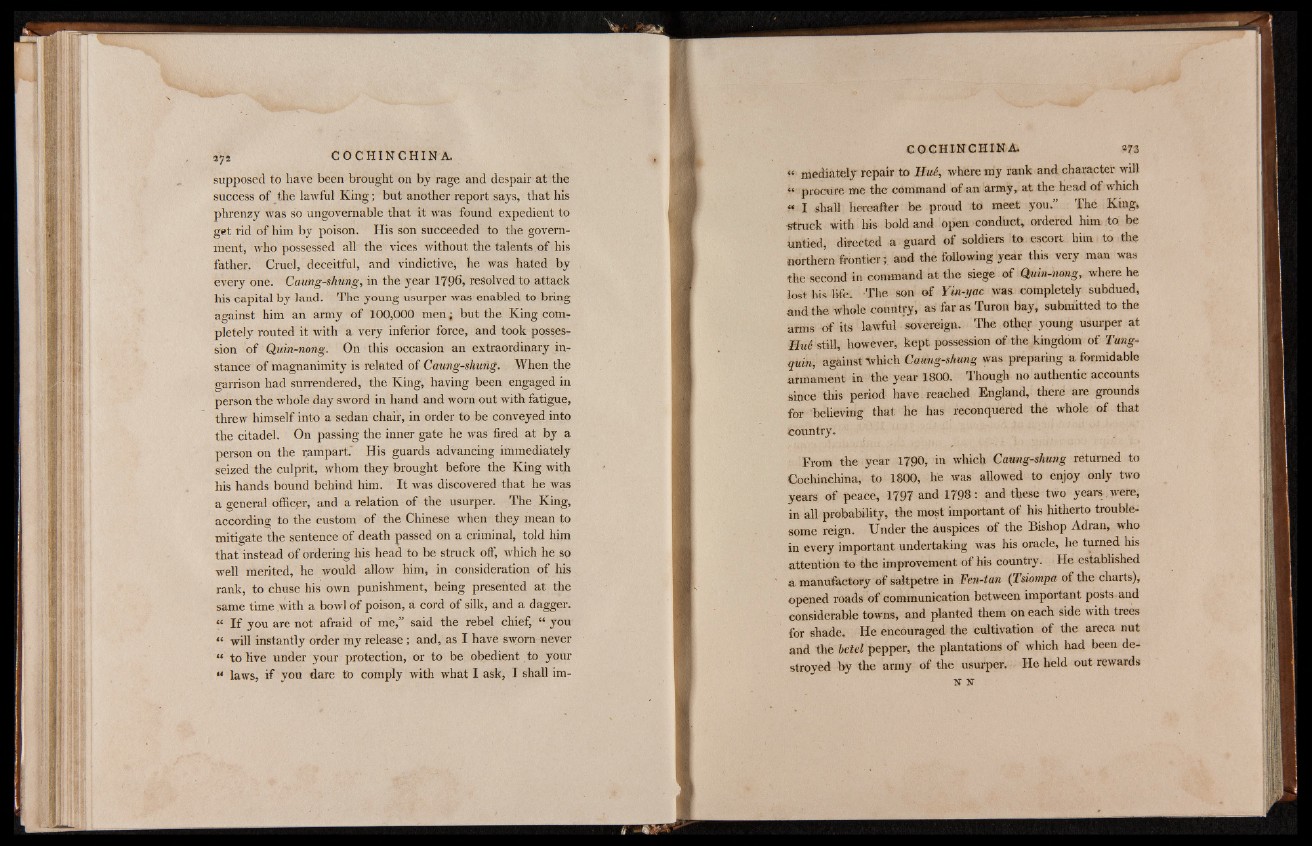
supposed to liave been brought on by rage and despair at the
success of the lawful King; but another report says, that his
phrenzy was so ungovernable that it was found expedient to
get rid of him by poison. His son succeeded to the government,
who possessed all the vices without the talents of his
father. Cruel, deceitful, and vindictive, he was hated by
every one. Caung-shung, in the year 179b, resolved to attack
his capital by land. The young usurper was enabled to bring
against him an army of 100,000 men; but the King completely
routed it with a very inferior force, and took possession
of Quin-nong. On this occasion an extraordinary instance
of magnanimity is related of Caung-shung. When the
garrison had surrendered, the King, having been engaged in
person the whole day sword in hand and worn out with fatigue,
threw himself into a sedan chair, in order to be conveyed into
the citadel. On passing the inner gate he was fired at by a
person on the r,ampart.' His guards advancing immediately
seized the culprit, whom they brought before the King with
his hands bound behind him. I t was discovered that he was
a general officpr, and a relation of the usurper. The King,
according to the custom of the Chinese when they mean to
mitigate the sentence of death passed on a criminal, told him
that instead of ordering his head to be struck off, which he so
well merited, he would allow him, in consideration of his
rank, to chuse his own punishment, being presented at the
same time with a bowl of poison, a cord of silk, and a dagger.
“ I f you are not afraid of me,” said the rebel chief, “ you
“ will instantly order my release; and, as I have sworn never
“ to live under your protection, or to be obedient, to your
“ laws, if you dare to comply with what I ask, I shall im-
“ mediately repair to Hué, where my rank and character will
“ procure me the command of an army, at the Head of which
“ I shall hereafter be proud to meet you.” The King,
■struck with his bold and open conduct, ordered him to be
untied, directed a guard of soldiers to escort him to the
northern frontier; and the following year this very man was
the second in command at the siege of Quin-nang, where he
lost his life. The son of Ym-yac was completely subdued,
and the whole country, as far as Turon bay, submitted to the
arms of its lawful sovereign. The other young usurper at
Hud still, however, kept possession of the kingdom of Tung-
quin, against which Caung-shung was preparing a formidable
armament in the year 1800. Though no authentic accounts
since this period have. reached England, there are grounds
for believing that he has reconquered the whole of that
country.
From the year 1790, in which Caung-shung returned to
Cochinchina, to 1800, lie was allowed to enjoy only two
years of peace, 1797 and 1798: and these two years , were,
in all probability, the most important of his hitherto troublesome
reign. Under the auspices of the Bishop Adran, who
in every important undertaking was his oracle, he turned his
attention to the improvement of his country. He established
a manufactory of saltpetre in Fen-tan (Tsiompa of the charts),
opened roads of communication between important posts and
considerable towns, and planted them on each side with trees
for shade. He encouraged the cultivation of the areca nut
and the betel pepper, the plantations of which had been destroyed
by the army of the usurper. He held out rewards
N N